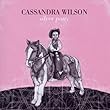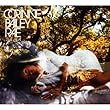 Standards challenge the singer to match or surpass those who have come before (and Streisand’s version of “Lover Come Back to Me,” both frantic and erotic, is in my head), but Cassandra Wilson reflects on the lyrics as she sings—registering relish and regret—and improvises a bit of wordless wildness toward the end of “Lover Come to Back to Me,” making it hers. It is a good beginning for her album Silver Pony, which collects live and studio performances of old and new songs, some of which she has helped to write.
Standards challenge the singer to match or surpass those who have come before (and Streisand’s version of “Lover Come Back to Me,” both frantic and erotic, is in my head), but Cassandra Wilson reflects on the lyrics as she sings—registering relish and regret—and improvises a bit of wordless wildness toward the end of “Lover Come to Back to Me,” making it hers. It is a good beginning for her album Silver Pony, which collects live and studio performances of old and new songs, some of which she has helped to write.
Tag: music
The Storyteller, Live at Dizzy’s Club, by Randy Weston and his African Rhythms Sextet
 The work of jazz musician Randy Weston has great authority, and in it light notes are balanced—or haunted—by dark chords; and there is jostling energy and yearning horns and a shuffling beat within stark arrangements: there is majesty, depth, and pleasure.
The work of jazz musician Randy Weston has great authority, and in it light notes are balanced—or haunted—by dark chords; and there is jostling energy and yearning horns and a shuffling beat within stark arrangements: there is majesty, depth, and pleasure.
Privileged Intimacies: The Conformist by Doveman, featuring Thomas Bartlett
 Boys can be as cruel when nonchalant as they are when intense. “Of your body now I’ve had my fill,” Bartlett declares in “Angel’s Share,” a song that admits that paradise is accidental and does not last. “If the story’s broken, well it’s easy to mend. If you don’t love her, you can always pretend,” claims Bartlett, in a song (“The Burgundy Stain”) that acknowledges that evidence of the truth will linger despite denials. Some girls move as swiftly, as selfishly, as certain boys.
Boys can be as cruel when nonchalant as they are when intense. “Of your body now I’ve had my fill,” Bartlett declares in “Angel’s Share,” a song that admits that paradise is accidental and does not last. “If the story’s broken, well it’s easy to mend. If you don’t love her, you can always pretend,” claims Bartlett, in a song (“The Burgundy Stain”) that acknowledges that evidence of the truth will linger despite denials. Some girls move as swiftly, as selfishly, as certain boys.
Dreams, Pleasures, Rhythms: Melt White by Brass Bed
 Sometimes the simple things take courage: it can take courage to cry or to smile, especially if others are pretending to have no feelings at all. It also takes a certain strength to identify an ideal and remain committed to it, especially if it is an old ideal in a time of changing values, when decadent indulgences reign. I thought of that after listening to Brass Bed, and finding myself remembering the Beatles and the Beach Boys and the dreamy popular music that followed those two groups in different forms through the decades.
Sometimes the simple things take courage: it can take courage to cry or to smile, especially if others are pretending to have no feelings at all. It also takes a certain strength to identify an ideal and remain committed to it, especially if it is an old ideal in a time of changing values, when decadent indulgences reign. I thought of that after listening to Brass Bed, and finding myself remembering the Beatles and the Beach Boys and the dreamy popular music that followed those two groups in different forms through the decades.
Modern Folk Wisdom in Music: Horace Trahan, Keep Walking
 Horace Trahan, like the singers Marc Broussard and Dege Legg, sounds like a soul forcing its fire through a body and out of a mouth. Trahan, who name-checks the Beastie Boys and Duran Duran and Judas Priest, wanted his traditional music to bear some relation to the contemporary world (“I love all kinds of music.”).
Horace Trahan, like the singers Marc Broussard and Dege Legg, sounds like a soul forcing its fire through a body and out of a mouth. Trahan, who name-checks the Beastie Boys and Duran Duran and Judas Priest, wanted his traditional music to bear some relation to the contemporary world (“I love all kinds of music.”).
Private Music, Public Art: Oyo by Angelique Kidjo
 Angelique Kidjo listened to the music of Bella Bellow, James Brown, Aretha Franklin, Marvin Gaye and other Motown artists, Miriam Makeba, Curtis Mayfield, and Otis Redding. She listened to all kinds of music, in different languages. Full of curiosity and enthusiasm, Angelique Kidjo was a girl whose singing was enjoyed by her community, but as she became a young woman that attitude changed—because women entertainers were viewed with moral skepticism—and Kidjo was criticized and taunted, but with her family’s support she continued to sing.
Angelique Kidjo listened to the music of Bella Bellow, James Brown, Aretha Franklin, Marvin Gaye and other Motown artists, Miriam Makeba, Curtis Mayfield, and Otis Redding. She listened to all kinds of music, in different languages. Full of curiosity and enthusiasm, Angelique Kidjo was a girl whose singing was enjoyed by her community, but as she became a young woman that attitude changed—because women entertainers were viewed with moral skepticism—and Kidjo was criticized and taunted, but with her family’s support she continued to sing.
I Would Like to Call It Beauty: Corinne Bailey Rae’s The Sea
 I had not known or remembered how talented Corinne Bailey Rae is; more than a unique singer—her voice can seemed to be held in the air, suspended by contemplation, savoring mood and sense—she plays several instruments, including piano and guitar (and glockenspiel, glass organ, autoharp). The first song on The Sea does not seem to end the silence that preceded it, but to extend that silence and then to slowly give it details, with Bailey Rae’s delicate voice and her piano and guitar.
I had not known or remembered how talented Corinne Bailey Rae is; more than a unique singer—her voice can seemed to be held in the air, suspended by contemplation, savoring mood and sense—she plays several instruments, including piano and guitar (and glockenspiel, glass organ, autoharp). The first song on The Sea does not seem to end the silence that preceded it, but to extend that silence and then to slowly give it details, with Bailey Rae’s delicate voice and her piano and guitar.
Masterpiece; or, The Intimate Art of Song: Love is the Answer by Barbra Streisand
 It is in Streisand’s inflections—her diction, pacing, and tone—that one can identify some of Streisand’s talent, as she remembers a love in the composition “In the Wee Small Hours of the Morning,” which Frank Sinatra sang (it was written by Bob Hilliard and David Mann, and here has a piano solo by Diana Krall, who serves as Streisand’s producer for Love is the Answer). Streisand’s inflections, like that of Sinatra, return dignity and understanding to human experience.
It is in Streisand’s inflections—her diction, pacing, and tone—that one can identify some of Streisand’s talent, as she remembers a love in the composition “In the Wee Small Hours of the Morning,” which Frank Sinatra sang (it was written by Bob Hilliard and David Mann, and here has a piano solo by Diana Krall, who serves as Streisand’s producer for Love is the Answer). Streisand’s inflections, like that of Sinatra, return dignity and understanding to human experience.
Idol Rising (Toward Individuality): The Element of Freedom by Alicia Keys, with her Unplugged collection
 (Yelling and screaming are what people who are incapable of eloquence or self-control regularly do; and artists have imitated that to indicate genuine feeling. Is that honesty, invention, or a crude, pandering sentimentality; or, is it, possibly, all of these? It is not art or craft as each has been long, traditionally understood: art has been about evolution, improvement, refinement. It is an irony that the twentieth-century modern era has used the primitive, the raw, the stupid, and the ugly as invigorating, persuasive powers; and many people are still convinced by that kind of power.)
(Yelling and screaming are what people who are incapable of eloquence or self-control regularly do; and artists have imitated that to indicate genuine feeling. Is that honesty, invention, or a crude, pandering sentimentality; or, is it, possibly, all of these? It is not art or craft as each has been long, traditionally understood: art has been about evolution, improvement, refinement. It is an irony that the twentieth-century modern era has used the primitive, the raw, the stupid, and the ugly as invigorating, persuasive powers; and many people are still convinced by that kind of power.)
Goddess, Artist, Woman: Mariah Carey’s Memoirs of an Imperfect Angel and #1s
 Hip-hop promotes aggressive attitudes and beats and rhetorical and rhyming speech, and the biracial Mariah Carey’s persona—visually wearing the short, tight clothes of a youthful fantasy; and vocally using the intonation of a rough girl—sometimes seems that of the tender-tough moll of a money-making neighborhood thug rather than the eloquent, fashion couture-wearing incarnation of a first-rate international performer, for whom sophistication of various kinds is an inevitability.
Hip-hop promotes aggressive attitudes and beats and rhetorical and rhyming speech, and the biracial Mariah Carey’s persona—visually wearing the short, tight clothes of a youthful fantasy; and vocally using the intonation of a rough girl—sometimes seems that of the tender-tough moll of a money-making neighborhood thug rather than the eloquent, fashion couture-wearing incarnation of a first-rate international performer, for whom sophistication of various kinds is an inevitability.